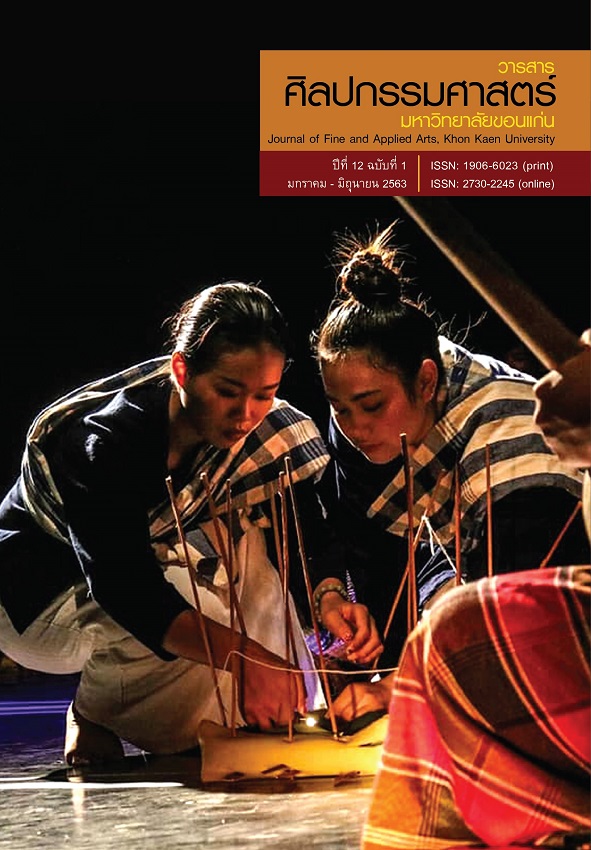กระบวนการเรียนรู้ด้วยการนำตนเองของนักกีตาร์ชาวไทย กรณีศึกษา ธรรมรัตน์ ดวงศิริ
Main Article Content
บทคัดย่อ
การวิจัยเชิงคุณภาพแบบการศึกษาเฉพาะกรณีนี้มีวัตถุประสงค์ เพื่อศึกษาและวิเคราะห์กระบวนการเรียนรู้ด้วยการนำตนเองของธรรมรัตน์ ดวงศิริ และนำเสนอแนวทางการสร้างทักษะการเรียนรู้ด้วยตนเองในศตวรรษที่ 21 สำหรับนักกีตาร์ เก็บข้อมูลโดยใช้วิธีการสัมภาษณ์แบบไม่เป็นทางการและการสังเกตแบบมีส่วนร่วม ผลการวิจัยพบว่า
1) กระบวนการเรียนรู้ด้วยการนำตนเองของธรรมรัตน์ ดวงศิริ เป็นบุคคลที่มีระดับการเรียนรู้ด้วยการนำตนเองในขั้นสูง ประกอบด้วย การวิเคราะห์ตนเองได้ว่า ชอบและสนใจในเรื่องอะไร รู้ขอบเขตเป้าหมาย รับผิดชอบควบคุมจัดการสภาพแวดล้อมในการเรียนรู้ ประเมินการเรียนรู้การฝึกซ้อม จนสามารถประยุกต์ให้เข้ากับสไตล์รูปแบบการเล่นและสร้างผลงานที่ดีเป็นของตัวเอง ใช้เทคโนโลยีเป็นเครื่องมือ พัฒนาและบูรณาการทักษะที่จำเป็นหลายด้าน เชื่อมโยงการเรียนรู้กับการทำงานเป็นสิ่งเดียวกัน โดยมีปัจจัยที่ส่งผลคือจัดการสภาพแวดล้อมโดยการดูแลรักษาอุปกรณ์ให้ดีอยู่เสมอ ใช้การปฏิสัมพันธ์กับนักดนตรี ผู้ชมในแวดวงการจากโซเชียลเน็ตเวิร์ค จัดกิจกรรมดนตรี เพื่อทำให้เกิดแรงจูงใจในการเรียนรู้ ปัญหาอุปสรรคของรูปแบบการเรียนรู้ด้วยการนำตนเอง ไม่มีผู้สอนคอยแนะนำให้คำปรึกษา จึงใช้ระยะเวลาในการเรียนรู้มาก ต้องมีวินัย ความมุ่งมั่นพยายามและควบคุมตนเองในระดับที่ดี
2) แนวทางการสร้างทักษะการเรียนรู้ด้วยการนำตนเองในศตวรรษที่ 21 สำหรับนักกีตาร์ คือ ให้ความสำคัญกับแนวคิด วิธีนำเสนอตัวเองให้โดดเด่น เข้าใจถึงบทบาทหน้าที่ที่แตกต่างกันในแต่ละบริบทการทำงาน และเน้นถึงการเรียนรู้จากประสบการณ์ สภาพแวดล้อม ปัญหาที่พบเจอจากสถานการณ์การทำงาน มาปรับปรุงแก้ไขเพื่อพัฒนาให้ครั้งต่อไปสมบูรณ์ยิ่งขึ้น
Article Details
เนื้อหาและข้อมูลในบทความที่ลงตีพิมพ์ในวารสารคณะศิลปกรรมศาสตร์ มหาวิทยาลัยขอนแก่น ถือเป็นความคิดเห็นและความรับผิดชอบของผู้เขียนบทความโดยตรง ซึ่งกองบรรณาธิการไม่จำเป็นต้องเห็นด้วย หรือร่วมรับผิดชอบใด ๆ
บทความ ข้อมูล เนื้อหา รูปภาพ ฯลฯ ที่ได้รับการตีพิมพ์ในวารสารคณะศิลปกรรมศาสตร์ มหาวิทยาลัยขอนแก่น ถือเป็นลิขสิทธิ์ของวารสารคณะศิลปกรรมศาสตร์ มหาวิทยาลัยขอนแก่น หากบุคคลหรือหน่วยงานใดต้องการนำทั้งหมดหรือส่วนหนึ่งส่วนใดไปเผยแพร่ต่อหรือเพื่อกระทำการใด ๆ จะต้องได้รับอนุญาตเป็นลายลักอักษรจากวารสารคณะศิลปกรรมศาสตร์ มหาวิทยาลัยขอนแก่น ก่อนเท่านั้น
เอกสารอ้างอิง
ชวลิต ชูกำแพง. (2550). การประเมินการเรียนรู้. มหาสารคาม: สำนักพิมพ์มหาวิทยาลัยมหาสารคาม.
ชัยยศ อิ่มสุวรรณ์. (2549). การเรียนรู้ด้วยตนเองเพื่อการศึกษาตลอดชีวิต. เดลินิวส์, 27.
ชาย โพธิสิตา. (2559). ศาสตร์และศิลป์แห่งการวิจัยเชิงคุณภาพ. พิมพ์ครั้งที่ 7. กรุงเทพฯ: อมรินทร์พริ้นติ้ง.
ณรุทธ์ สุทธจิตต์. (2538). หลักสูตรดนตรี. กรุงเทพฯ: สำนักพิมพ์แห่งจุฬาลงกรณ์มหาวิทยาลัย.
ณรุทธ์ สุทธจิตต์. (2541). จิตวิทยาการสอนดนตรี .พิมพ์ครั้งที่ 4. กรุงเทพฯ: สำนักพิมพ์แห่งจุฬาลงกรณ์มหาวิทยาลัย.
ทิศนา แขมมณี. (2552). ศาสตร์การสอน องค์ความรู้เพื่อการจัดกระบวนการเรียนรู้ที่มีประสิทธิภาพ.
พิมพ์ครั้งที่ 10. กรุงเทพฯ: ด่านสุทธาการพิมพ์.
นภเนตร ธรรมบวร. (2551). หลักสูตรการศึกษาปฐมวัย. กรุงเทพฯ: สำนักพิมพ์แห่งจุฬาลงกรณ์มหาวิทยาลัย.
นฤมล บุญส่ง. (2561). สื่อสังคมกับการเรียนการสอนในศตวรรษที่ 21. วารสาร Veridian E Journal มหาวิทยาลัยศิลปากร, 11(1), 154.
ปราชญ์ อรุณรังษี. (2544). การฝึกอย่างมีประสิทธภาพ พัฒนาการสูงสุดโดยใช้เวลาน้อยสุด. Overdrive, 3, 29.
วรชาติ กิจเรนู. (2547). การวิเคราะห์แนวทางการเล่นกีตาร์ของผู้ได้รับรางวัลชนะเลิศจากการประกวดโอเวอร์ไดรฟ์ กีตาร์คอนเทส ครั้งที่ 4. วิทยานิพนธ์ปริญญาศิลปศาสตรมหาบัณฑิต สาขาดนตรีศึกษา วิทยาลัยดุริยางคศิลป์ มหาวิทยาลัยมหิดล.
วิจารณ์ พานิช. (2555). วิถีสร้างการเรียนรู้เพื่อศิษย์ในศตวรรษที่ 21. กรุงเทพฯ: มูลนิธิสดศรี-สฤษดิ์วงศ์.
สมบูรณ์ ศาลยาชีวิน. (2526). จิตวิทยาเพื่อการศึกษาผู้ใหญ่. เชียงใหม่: ลานนาการพิมพ์.
สำนักงานบริหารงานการมัธยมศึกษาตอนปลาย [สพฐ]. (2558). แนวทางการจัดการเรียนรู้ในศตวรรษที่ 21 ที่เน้นสมรรถนะทางวิชาชีพ. กรุงเทพฯ: โรงพิมพ์ชุมนุมสหกรณ์การเกษตรแห่งประเทศไทย.
สุภางค์ จันทวานิช. (2552). การวิเคราะห์ข้อมูลในการวิจัยเชิงคุณภาพ. พิมพ์ครั้งที่ 9. กรุงเทพฯ: สำนักพิมพ์แห่งจุฬาลงกรณ์มหาวิทยาลัย.
สุรางค์ โค้วตระกูล. (2548). จิตวิทยาการศึกษา. พิมพ์ครั้งที่ 12. กรุงเทพฯ: สํานักพิมพ์แห่งจุฬาลงกรณ์มหาวิทยาลัย.
Burner, J. (1993). Schools for learning. Cambridge: MIT Press.
Kolb, A. (1984). Experiential Leaning: Experience as the Source of Learning and Development. Englewood Cliffs, NJ: Prentice Hall.
Partnership for 21st century skills. (2009). P21 framework definitions document. Retrieved March 29, 2018, from http://www.21stcenturyskills.org/documents/p21_framework_ definitions_052909.pdf on April 2018
Prensky, M. (2008). The role of technology in teaching and the classroom. Educational Technology, 48(6), 64.
Treffinger, J. (1995). Creative problem solving: Overview and educational implications. Educational Psychology Review, 7(3), 301–312.


